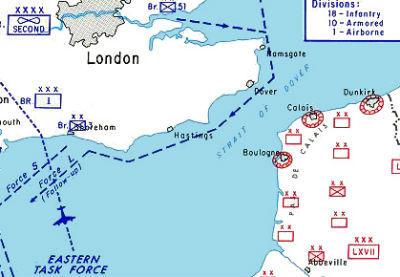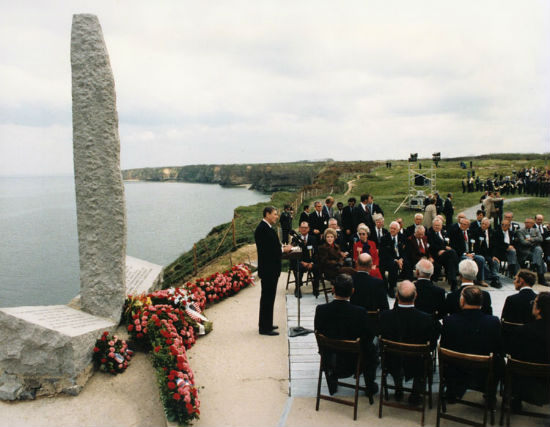 Allied invasion force. Click map to enlarge.
Allied invasion force. Click map to enlarge.By Neil Earle
Seventy years ago this summer the anxious mothers of North America were waiting for news from England. The long-expected invasion of Europe from Allied bases in England could come any minute. So many men, munitions and equipments had poured into that island base through 1943-44 that the joke was it’s only the barrage balloons keeping the island afloat.
On the night of June 5, 1944 the paratroopers prepared to go in and clear the way and secure the road nets of Normandy where possible. The next morning the first wave could be seen off Normandy. The German defenders gaped at the sight of 7000 ships and more than 130,000 troops ready to disembark. This was the advance force for 250,000 soldiers of various nations who made up the initial Allied Expeditionary Force.
The world knows that story well and our remaining veterans know the stakes involved. A failed Allied invasion of Europe in 1944 would HAVE set the defeat of Adolph Hitler’s Nazi empire back for months, if not years. Who knows what advanced weapons Hitler’s scientists would have developed by then? They already had perfected the V-1 and V-2 missile and the Tiger II tank would be the best of the land war. Who knows how many other prisoners in concentration camps would meet their end?
As it turned out the operation was a resounding success. Even Soviet dictator Joseph Stalin was impressed. The Western nations could not only put together the greatest amphibious operation in history but could fight toe-to-toe with the Wehrmacht when necessary and push them back from positions defended by Erwin Rommel, the Desert Fox.
Thus it was that legends began to grow up attached to D-Day and our victory in World War Two, a legend that was not all myth by any means. In essence it came down to a belief that you could cut with a knife if you grew up in 1950s and 1960s grassroots culture. There seemed to be a collective understanding filtered down from our elders that we in the North Atlantic world were the standard bearers of human freedom, that we would fight like tigers when our way of life was threatened, and never again allow the kind of atrocities that Nazism had inflicted on so many people.
The wounded veteran William Manchester in writing the life of Britain’s wartime leader Winston Churchill wrote a phrase that has stuck with me. “Thus he defended Western civilization when men thought it was worth every sacrifice.”
This sets up some interesting reflections on this 70th anniversary of the Norman summer. Some core values of “Western civ” have been under fairly heavy attack since the 1960s. In the 1980s a chant emerged “Hey, hey, ho, ho/Western Culture has got to go.” By then a full-blown assault on Western assumptions regarding the values that hold societies together was launched under the term “deconstruction.” The British writer Henry Fairlie explained it as “Nowadays when we hear of missionaries being persecuted in a Third World zone we usually think, what are they doing there anyway?”
A certain loss of confidence that historian Kenneth Burke saw as essential for a civilization to thrive seems a sign of the times. This is a broad subject indeed but the brilliant Yale historian, Niall Ferguson, a Scotsman, examined what made the West dominant in his Civilization: The West and the Rest. For after all is said and done, even with the “Rise of the Rest” (China, India, Brazil, etc.) it is still to Western nations – North Atlantic powers, that million look for trade, commerce, defense, deliverance from disaster and even as a locus for migration.
Ferguson says the common reason offered for Western dominance is imperialism, dominating other nations by force. But this, he claims, begs the question. Imperialism – domination in the interests of God, Gold and Glory – was assuredly part of the Western project these past 400 years. But this, claims Ferguson, is a result more than a cause of things. Ferguson identifies six “killer apps” that took a long time fructifying before reaching maximum impact in the Nineteenth and Twentieth Centuries. These Ferguson lists in true professorial style:
First, geography. Ferguson argues that Western Europe’s plenteous rivers, forests, mountains and lakes made totalitarian control more difficult. He contrasts the vast regions of China consolidated under the emperors or Islam’s control over the deserts against the tightly organized, independence-loving city-state networks of Venice, Florence, Paris, London and others. Likewise, even the mighty British army couldn’t hold down the rebels of 1776 along a 1300 mile sea coast and a vast interior. The Great Powers that had emerged by the 1800s – fiercely independent, cantankerous, yes, warlike, often, but also nourishing a strong bias towards popular sovereignty. Competition versus “the retarding effect of monopoly in East Asia” was Ferguson’s first prerequisite for the rise of the West.
 President Reagan giving speech on the 40th Anniversary of D-Day at Pointe du Hoc, Normandy, France, 1984.
President Reagan giving speech on the 40th Anniversary of D-Day at Pointe du Hoc, Normandy, France, 1984.Secondly, scientific innovation, especially with the military applications that sped Western dominance. The year Galileo died (1642) was the year Isaac Newton was born and the political freedom that allowed these discoveries to be pursued gave an edge in “brainpower as much as firepower” in Ferguson’s phrase. “Yankee ingenuity” fits in here as well when knowledge transfers spanned the North Atlantic world. Remember Ben Franklin and the kite.
Third, argues Ferguson, is the Rule of Law. As my history classes probably know, I rank this one first. We can see in such struggling entities as Iraq and the Sudan how countries in a state of tribalism are often hard pressed to evolve workable sanctions against tyranny. “The great and chief end of men’s uniting into Commonwealths is the preservation of their property,” wrote John Locke in 1690. This mantra became a standard in England and a virtual religion in America. “A man’s home is his castle” was not always true all across the board but today’s disputes about “rights’ stems from this axiom of Western Civ, a view which in the North Atlantic world had the sanctity of Religion behind it. “The rights of man descend not from the generosity of the State but from the hand of God” – that was John F. Kennedy in 1961 channeling Jefferson who channeled Locke.
Medicine, the Consumer/Market Society and the Work Ethic round out Ferguson’s six-fold reasons for the Rise of the West. To make this weighty analysis even more prolonged, I would have added the Protestant Reformation of the 1500s and the freedom of thought inherent in each individual’s right to read the Bible for himself.
Does any of this shed light on the crucial dynamic at work on June 6, 1944? Did the young men sloshing around nervously on their landing boats that morning feel there were some high-minded principles at stake to justify their sacrifice? Perhaps they were too scared to connect all the dots that terrible day. Some were so sea-sick they didn’t care if they lived or died. But given that 90% could be killed in the first wave, it is clear that a robust belief in something bigger than Gold or Glory had influenced their upbringing. What was it that gave the stalwarts of D-Day the impetus to brave the water-logged chaos to gain the upper hand and “redeem a continent,” as we used to say?
“There's nothing wrong with my country that Hitler can fix,” explained the African-American boxer Joe Louis, when asked why he had enlisted to fight for a country that often held him down. That had the eloquence of simplicity about it, as did President Roosevelt’s moving prayer to the nation on D-Day and both President Eisenhower and Reagan’s later belief that a just God gave the Allies the victory to set free a suffering humanity. That may be too much for us mortals to affirm with total confidence but such were the words spoken.
Many who landed at Omaha or Juno beach didn’t feel heroic. One of my boyhood friends back in Canada had an uncle who said “many of us signed up because there was nothing much to do at home.”
Sadly, the score-card since June 6, 1944 shows that Hitler’s atrocities have been more than a little mimicked in places such as Bosnia, Rwanda, Somalia, the recent naked coup in the Crimea, the hostage-takers in Nigeria, the under-reported chaos going on in the Central African Republic.
Lately we have been learning that we simply cannot bear any burden, pay any price, oppose every foe for the defense of our way of life anywhere and everywhere “Western” values are threatened. It is disillusioning to learn that the John Wayne movies and the Sergeant Rock comics of our youth were rooted in a kind of pop distortion of what the Allied armies were doing in Normandy that summer. But something heroic about the quest filtered down to many of my generation. We remembered those highly respected veterans walking among us and enjoying their well-earned status – some even wore their khaki jackets into the 1950s. Perhaps 70 years later we can more fairly assess their contribution with the perspective that time bestows.
As a sometime history teacher I can say this: I am surprised and gratified that this 70th anniversary of D-Day is still being held in high honor. As a Christian I know that wherever great sacrifice is expended in a noble cause then God is well-pleased. “Whatever is noble, whatever is right, whatever is admirable…if anything is excellent or praiseworthy…think about such things (Philippians 4:8).
And yes, Western Civ may well fail the final test at the bar of history, as many of today’s vociferous critics charge. On the other hand, with the enormous associations of sacrifice and the human price paid on June 6,1944, it may not.
(Neil Earle teaches history at Grace Communion Seminary out of Glendora, CA.)